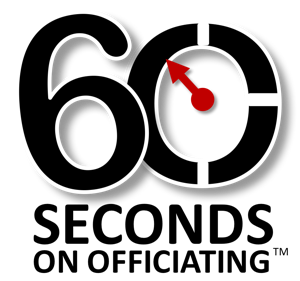
The Tower Philosophy
It’s all about application of the rules to maintain balance and fairness.
Take a peek at the underlying philosophy that should guide your officiating style and judgment called the Tower Philosophy.
Created by Oswald Tower (IAABO Interpreter) over 60 years ago, this common sense framework guides our officiating judgment of fast moving players in a very confined space to maintain balance between offense and defense while penalizing infractions that disrupt this flow.
If players are unfairly affected as a result of an infraction of the rules, then the player not in compliance must be penalized.
But if there has been no appreciable effect upon the progress of the game, then the game shall not be stopped. The action should be ignored.
This takes into account some key elements of experience and understanding of the game. This includes:
- The officials have a keen understanding of the mood and climate of the game.
- The crew is aware of the skill levels and match-ups present on the court.
- As officials we can exercise mature judgment based on the Tower Philosophy, and apply it fairly to both competing teams.
How often do we get “bogged-down” in esoteric debates or even presented questions on our yearly refresher examinations that happen once in a lifetime (if at all), and are expected to know the rule application of such.
The Tower Philosophy gives us a set of guiding principles to make rulings on game situations that cause one team to be put at a disadvantage — or another team gaining an unfair advantage. It’s this balance that allows the philosophy to work well in our game.
Here’s some common sense ways to apply this philosophy.
- Not all contact is illegal. Situations where contact does not penalize a player (or team) should be deemed “incidental” and allow the play to continue. This prevents a contest from being turned into a long / drawn series of fouls and free-throws. Officials that can see the “whole play” and determine if a team was put at a disadvantage — in real time — is a desired skill.
- All contact must be looked at in context to the effect it has on the game. One of my favorite (controversial) topics is the team fouling at the end of a game to stop the clock. While by rule this type of non-basketball play that is designed to stop the clock put the offensive team at a disadvantage, many officials are reluctant to rule this an Intentional Foul, and penalize as such. On the other side, allowing a player to continue dribbling when being contacted from behind, keeps balance and does not provide an advantage to the defenders. That “quick foul” you whistle, while preventing a hard foul, does change the balance of the game.
- If there is no apparent disadvantage to an opponent, then realistically speaking, no rules violation has occurred. While this one might be a bit harder to swallow it does make sense. One example that comes to mind is when a player leaves the floor during live play. If they intentionally do this and avoid a screen one can see how the defense is put at a disadvantage. But if a player causally steps off the playing surface this most likely would not result in a violation as the opponent was not put at a disadvantage. Applying this philosophy results in no violation.
Here’s a couple of key tips that will help you leverage the “Tower Philosophy” in your upcoming contests.
Think Angles and Distance
Make sure you are in a proper position to render a common-sense judgement ruling on each and every play in your primary coverage area. Being in this spot will allow you to make more accurate rulings and apply the advantage-disadvantage principles. Always seek the angle first, then cut down the distance to make your rulings credible. Angles then distance.
Own Your Primary and Be Ready to Assist Your Crew in Theirs
While it’s imperative we all officiate the prescribed primary coverage areas (PCA’s) it’s perfectly acceptable to “assist” your crew in gray areas or even their own PCA. While you should not be looking to officiate the entire playing surface, being “wide-eyed” and aware of the surroundings beyond your PCA is key. The NCAA has started an interesting approved mechanic where officials are reminded when there are no competitive match-ups in their PCA it’s perfectly acceptable to assist on out-of-bounds or foul rulings if you are 100% sure a player was put at a disadvantage. Some traditionalists might say this is “reaching” out of your PCA – but others position this as “getting the play right.”
Know the Rules – Inside and Out
It would be quite difficult to apply a “rules philosophy” if you don’t have the foundational knowledge in the first place. Even if your not a book-person it’s quite easy to take bite size chunks of the NFHS / NCAA rulebook and study small sections at a time. Websites like this (ref60.com) provide a constant dose of paramedic training to help keep you out of trouble.
Keep the Tower Philosophy top-of-mind in your quest to become a successful official and recognize there is a balance of advantage vs disadvantage only YOU can control.
